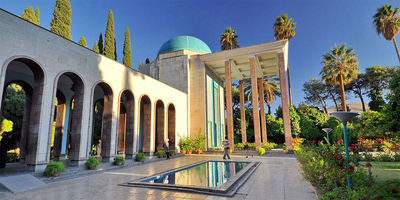The Iranian Society of Cultural Works and Luminaries will organize the event with contributions from the Embassy of Iran in Dushanbe, Tajikistan, one day earlier than what is registered on the Iranian calendar.
Although this year's Sadi Day falls on Thursday, the organizers gave no comment on why the webinar will be held one day earlier.
The webinaar will start at 4 pm with a speech by Iranian Society of Cultural Wofks and Luminaries director Hassan Bolkhari.
Sadi Foundation directoe Gholam-Ali Haddad-Adel, who is also in charge of the Academy of Persian Language and Literature, will deliver a lecture.
Sharif Morod Esrofil of the Tajik State Pedagogical University, Tajik Sadi expert Obid Shakurzoda and their compatriot artist Ortiq Qodirov will attend the webinar.
Pakistani Persian literature scholar Syed Najmi Hasan Zaidi and Kambarbekova Galiya Amzeevna, head of the Iranian Studies Department at the Al-Farabi Kazakh National University, will also deliver lectures.
Asghar Dadbeh of Allameh Tabatabai University and Mehdi Mohabati of the University of Zanjan are among the Iranian guests of the event.
As one of the greatest figures of classical Persian literature, Sadi, the byname of Musharraf ad-Din ibn Muslih ad-Din, is famous worldwide for his Bustan (The Orchard) and Gulistan (The Rose Garden), which have been translated into many languages.
Iranians celebrate Sadi Day on 1st Ordibehesht in their national calendar. The day marks the anniversary of the completion of the Gulistan.
Sadi was introduced to the generation of Iranians that are now in their fifties with the following verses at the primary school level:
The sons of Adam are limbs of each other
Having been created of one essence.
When the calamity of time afflicts one limb
The other limbs cannot remain at rest.
If thou hast no sympathy for the troubles of others
Thou art unworthy to be called by the name of a man.
For Western students the Bustan and Gulistan have a special attraction; but Sadi is also remembered as a great panegyrist and lyricist, and as the author of a number of masterly general odes portraying human experience as well as particular odes such as the lament on the fall of Baghdad after the Mongol invasion in 1258.
His lyrics are to be found in Ghazaliyat (“Lyrics”) and his odes in Qasayed (“Odes”). Six prose treatises on various subjects are attributed to him; he is also known for a number of works in Arabic. The peculiar blend of human kindness and cynicism, humor and resignation displayed in Sadi’s works, together with a tendency to avoid difficult dilemmas, make him, to many, the most widely admired writer in the world of Iranian culture.
Source:Tehran Times

